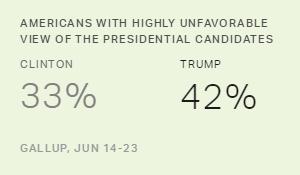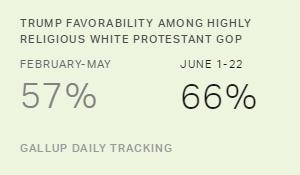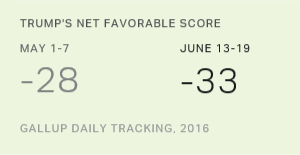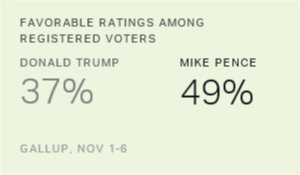Story Highlights
- Trump's poor favorability scores rival Barry Goldwater's
- Trump's high unfavorable score sets new record among candidates
- Clinton's image also low historically, just above Goldwater's
PRINCETON, N.J. -- Trump and Clinton are currently among the worst-rated presidential candidates of the last seven decades according to Gallup's long-term "scalometer" trend. In the race to the bottom, however, Trump's 42% highly unfavorable score easily outpaces Clinton's 33%. Prior to now, 1964 Republican nominee Barry Goldwater had the highest negative score, with 26% rating him highly unfavorably in October 1964.
| Nominee | Highly favorable | Highly unfavorable | |||||||||||||||||||||||||||||||||||||||||||||||||||||||||||||||||||||||||||||||||||||||||||||||||
|---|---|---|---|---|---|---|---|---|---|---|---|---|---|---|---|---|---|---|---|---|---|---|---|---|---|---|---|---|---|---|---|---|---|---|---|---|---|---|---|---|---|---|---|---|---|---|---|---|---|---|---|---|---|---|---|---|---|---|---|---|---|---|---|---|---|---|---|---|---|---|---|---|---|---|---|---|---|---|---|---|---|---|---|---|---|---|---|---|---|---|---|---|---|---|---|---|---|---|---|
| % (+4 to +5) | % (-4 to -5) | ||||||||||||||||||||||||||||||||||||||||||||||||||||||||||||||||||||||||||||||||||||||||||||||||||
| 1956 Oct 18-23 | D. Eisenhower | 57 | 4 | ||||||||||||||||||||||||||||||||||||||||||||||||||||||||||||||||||||||||||||||||||||||||||||||||
| 1964 Oct 8-13 | L. Johnson | 49 | 5 | ||||||||||||||||||||||||||||||||||||||||||||||||||||||||||||||||||||||||||||||||||||||||||||||||
| 1960 Oct 18-23 | J. Kennedy | 43 | 5 | ||||||||||||||||||||||||||||||||||||||||||||||||||||||||||||||||||||||||||||||||||||||||||||||||
| 1984 Sep 21-24 | R. Reagan | 43 | 18 | ||||||||||||||||||||||||||||||||||||||||||||||||||||||||||||||||||||||||||||||||||||||||||||||||
| 1976 Sep 24-27 | J. Carter | 42 | 5 | ||||||||||||||||||||||||||||||||||||||||||||||||||||||||||||||||||||||||||||||||||||||||||||||||
| 1972 Oct 13-16 | R. Nixon | 41 | 11 | ||||||||||||||||||||||||||||||||||||||||||||||||||||||||||||||||||||||||||||||||||||||||||||||||
| 1968 Oct 17-22 | R. Nixon | 39 | 8 | ||||||||||||||||||||||||||||||||||||||||||||||||||||||||||||||||||||||||||||||||||||||||||||||||
| 1960 Oct 18-23 | R. Nixon | 37 | 8 | ||||||||||||||||||||||||||||||||||||||||||||||||||||||||||||||||||||||||||||||||||||||||||||||||
| 2008 Oct 23-26 | B. Obama | 37 | 22 | ||||||||||||||||||||||||||||||||||||||||||||||||||||||||||||||||||||||||||||||||||||||||||||||||
| 2012 Oct 27-28 | B. Obama | 36 | 24 | ||||||||||||||||||||||||||||||||||||||||||||||||||||||||||||||||||||||||||||||||||||||||||||||||
| 2004 Oct 22-24 | G.W. Bush | 34 | 23 | ||||||||||||||||||||||||||||||||||||||||||||||||||||||||||||||||||||||||||||||||||||||||||||||||
| 1956 Oct 18-23 | A. Stevenson | 34 | 16 | ||||||||||||||||||||||||||||||||||||||||||||||||||||||||||||||||||||||||||||||||||||||||||||||||
| 1980 Oct 10-13 | J. Carter | 31 | 17 | ||||||||||||||||||||||||||||||||||||||||||||||||||||||||||||||||||||||||||||||||||||||||||||||||
| 2012 Oct 27-28 | M. Romney | 30 | 22 | ||||||||||||||||||||||||||||||||||||||||||||||||||||||||||||||||||||||||||||||||||||||||||||||||
| 1976 Sep 24-27 | G. Ford | 29 | 9 | ||||||||||||||||||||||||||||||||||||||||||||||||||||||||||||||||||||||||||||||||||||||||||||||||
| 1968 Oct 17-22 | H. Humphrey | 29 | 11 | ||||||||||||||||||||||||||||||||||||||||||||||||||||||||||||||||||||||||||||||||||||||||||||||||
| 1984 Sep 21-24 | W. Mondale | 28 | 15 | ||||||||||||||||||||||||||||||||||||||||||||||||||||||||||||||||||||||||||||||||||||||||||||||||
| 2008 Oct 23-26 | J. McCain | 28 | 20 | ||||||||||||||||||||||||||||||||||||||||||||||||||||||||||||||||||||||||||||||||||||||||||||||||
| 1992 Oct 23-25 | B. Clinton | 27 | 15 | ||||||||||||||||||||||||||||||||||||||||||||||||||||||||||||||||||||||||||||||||||||||||||||||||
| 1980 Oct 10-13 | R. Reagan | 26 | 16 | ||||||||||||||||||||||||||||||||||||||||||||||||||||||||||||||||||||||||||||||||||||||||||||||||
| 1992 Oct 23-25 | G.H.W. Bush | 25 | 18 | ||||||||||||||||||||||||||||||||||||||||||||||||||||||||||||||||||||||||||||||||||||||||||||||||
| 2004 Oct 22-24 | J. Kerry | 22 | 22 | ||||||||||||||||||||||||||||||||||||||||||||||||||||||||||||||||||||||||||||||||||||||||||||||||
| 2016 June 14-23 | H. Clinton | 22 | 33 | ||||||||||||||||||||||||||||||||||||||||||||||||||||||||||||||||||||||||||||||||||||||||||||||||
| 1972 Oct 13-16 | G. McGovern | 21 | 20 | ||||||||||||||||||||||||||||||||||||||||||||||||||||||||||||||||||||||||||||||||||||||||||||||||
| 1964 Oct 8-13 | B. Goldwater | 17 | 26 | ||||||||||||||||||||||||||||||||||||||||||||||||||||||||||||||||||||||||||||||||||||||||||||||||
| 2016 June 14-23 | D. Trump | 16 | 42 | ||||||||||||||||||||||||||||||||||||||||||||||||||||||||||||||||||||||||||||||||||||||||||||||||
| 2016 nominees are presumptive; Dates for all years except 2016 are final pre-election; No data for 1988, 1996 and 2000 | |||||||||||||||||||||||||||||||||||||||||||||||||||||||||||||||||||||||||||||||||||||||||||||||||||
| Gallup | |||||||||||||||||||||||||||||||||||||||||||||||||||||||||||||||||||||||||||||||||||||||||||||||||||
Gallup's 10-point scalometer favorability scale asks respondents to name a number between +1 and +5 to express a favorable view of a candidate, with +5 indicating a very favorable view. They are asked to name a number from -1 to -5 to indicate an unfavorable view, with -5 being very unfavorable. The survey was conducted by telephone June 14-23 with a nationwide sample of U.S. adults.
Since 1992, Gallup has primarily measured candidate favorability using a binary favorable/unfavorable choice. But Gallup does use the 10-point scale once or twice each campaign to allow for longer-term historical comparisons. The scalometer typically produces positive ratings about 10 points higher than the binary favorable scores.
Trump's Total Favorability Worse Than Goldwater's
In addition to his record-setting highly unfavorable rating, Trump's overall image on the scalometer tilts more negatively than Goldwater's did at his lowest point in 1964. Trump's combined ratings are 42% favorable and 59% unfavorable whereas Goldwater's broke about even at 43% favorable and 47% unfavorable.
Clinton's overall image on the scalometer -- 51% favorable vs. 50% unfavorable -- is also better than Trump's and slightly more positive than Goldwater's in October 1964. However, her ratings are no match for the Democratic incumbent in that year's election. President Lyndon Johnson had extraordinarily high positive ratings on the scale, reflecting his strong popularity less than a year after he assumed the presidency following John F. Kennedy's assassination. Johnson's total favorable score at the end of the 1964 race was a stellar 81%, with just 13% viewing him unfavorably, and he went on to win re-election by a historically high 61% to 38% in the popular vote.
Both Johnson and Goldwater were viewed a bit better at earlier points in the 1964 race than they were in October of that year. In particular, majorities viewed Goldwater favorably in Gallup's May and August polls. However, even Goldwater's 54% and 52% total favorable scores from these polls stand as some of the lowest in Gallup's records for a presidential nominee.
| May 22-27, 1964 | Aug 6-11, 1964 | Oct 8-13, 1964 | ||||||||||||||||||||||||||||||||||||||||||||||||||||||||||||||||||||||||||||||||||||||||||||||||||
|---|---|---|---|---|---|---|---|---|---|---|---|---|---|---|---|---|---|---|---|---|---|---|---|---|---|---|---|---|---|---|---|---|---|---|---|---|---|---|---|---|---|---|---|---|---|---|---|---|---|---|---|---|---|---|---|---|---|---|---|---|---|---|---|---|---|---|---|---|---|---|---|---|---|---|---|---|---|---|---|---|---|---|---|---|---|---|---|---|---|---|---|---|---|---|---|---|---|---|---|---|
| % | % | % | ||||||||||||||||||||||||||||||||||||||||||||||||||||||||||||||||||||||||||||||||||||||||||||||||||
| Total favorable (+1 to +5) | ||||||||||||||||||||||||||||||||||||||||||||||||||||||||||||||||||||||||||||||||||||||||||||||||||||
| L. Johnson | 87 | 87 | 81 | |||||||||||||||||||||||||||||||||||||||||||||||||||||||||||||||||||||||||||||||||||||||||||||||||
| B. Goldwater | 54 | 52 | 43 | |||||||||||||||||||||||||||||||||||||||||||||||||||||||||||||||||||||||||||||||||||||||||||||||||
| Highly favorable (+4 to +5) | ||||||||||||||||||||||||||||||||||||||||||||||||||||||||||||||||||||||||||||||||||||||||||||||||||||
| L. Johnson | 59 | 54 | 49 | |||||||||||||||||||||||||||||||||||||||||||||||||||||||||||||||||||||||||||||||||||||||||||||||||
| B. Goldwater | 15 | 21 | 17 | |||||||||||||||||||||||||||||||||||||||||||||||||||||||||||||||||||||||||||||||||||||||||||||||||
| Gallup | ||||||||||||||||||||||||||||||||||||||||||||||||||||||||||||||||||||||||||||||||||||||||||||||||||||
The following table displays the final scores for the major candidates in each election since 1956, with no ratings available for 1988, 1996 or 2000. In some cases, the final reading was higher than ratings earlier in the election year, and in other cases, the final reading was lower, making it unclear which way Clinton's and Trump's might go between now and November.
| Nominee | Total favorable | Total unfavorable | |||||||||||||||||||||||||||||||||||||||||||||||||||||||||||||||||||||||||||||||||||||||||||||||||
|---|---|---|---|---|---|---|---|---|---|---|---|---|---|---|---|---|---|---|---|---|---|---|---|---|---|---|---|---|---|---|---|---|---|---|---|---|---|---|---|---|---|---|---|---|---|---|---|---|---|---|---|---|---|---|---|---|---|---|---|---|---|---|---|---|---|---|---|---|---|---|---|---|---|---|---|---|---|---|---|---|---|---|---|---|---|---|---|---|---|---|---|---|---|---|---|---|---|---|---|
| % (+1 to +5) | % (-1 to -5) | ||||||||||||||||||||||||||||||||||||||||||||||||||||||||||||||||||||||||||||||||||||||||||||||||||
| 1956 Oct 18-23 | D. Eisenhower | 84 | 12 | ||||||||||||||||||||||||||||||||||||||||||||||||||||||||||||||||||||||||||||||||||||||||||||||||
| 1964 Oct 8-13 | L. Johnson | 81 | 13 | ||||||||||||||||||||||||||||||||||||||||||||||||||||||||||||||||||||||||||||||||||||||||||||||||
| 1976 Sep 24-27 | J. Carter | 81 | 16 | ||||||||||||||||||||||||||||||||||||||||||||||||||||||||||||||||||||||||||||||||||||||||||||||||
| 1960 Oct 18-23 | J. Kennedy | 80 | 14 | ||||||||||||||||||||||||||||||||||||||||||||||||||||||||||||||||||||||||||||||||||||||||||||||||
| 1968 Oct 17-22 | R. Nixon | 79 | 22 | ||||||||||||||||||||||||||||||||||||||||||||||||||||||||||||||||||||||||||||||||||||||||||||||||
| 1960 Oct 18-23 | R. Nixon | 79 | 20 | ||||||||||||||||||||||||||||||||||||||||||||||||||||||||||||||||||||||||||||||||||||||||||||||||
| 1976 Sep 24-27 | G. Ford | 78 | 20 | ||||||||||||||||||||||||||||||||||||||||||||||||||||||||||||||||||||||||||||||||||||||||||||||||
| 1972 Oct 13-16 | R. Nixon | 76 | 22 | ||||||||||||||||||||||||||||||||||||||||||||||||||||||||||||||||||||||||||||||||||||||||||||||||
| 1968 Oct 17-22 | H. Humphrey | 72 | 28 | ||||||||||||||||||||||||||||||||||||||||||||||||||||||||||||||||||||||||||||||||||||||||||||||||
| 1984 Sep 21-24 | R. Reagan | 71 | 30 | ||||||||||||||||||||||||||||||||||||||||||||||||||||||||||||||||||||||||||||||||||||||||||||||||
| 1980 Oct 10-13 | J. Carter | 68 | 32 | ||||||||||||||||||||||||||||||||||||||||||||||||||||||||||||||||||||||||||||||||||||||||||||||||
| 1984 Sep 21-24 | W. Mondale | 66 | 34 | ||||||||||||||||||||||||||||||||||||||||||||||||||||||||||||||||||||||||||||||||||||||||||||||||
| 1992 Oct 23-25 | B. Clinton | 65 | 32 | ||||||||||||||||||||||||||||||||||||||||||||||||||||||||||||||||||||||||||||||||||||||||||||||||
| 2008 Oct 23-26 | J. McCain | 64 | 35 | ||||||||||||||||||||||||||||||||||||||||||||||||||||||||||||||||||||||||||||||||||||||||||||||||
| 1980 Oct 10-13 | R. Reagan | 64 | 37 | ||||||||||||||||||||||||||||||||||||||||||||||||||||||||||||||||||||||||||||||||||||||||||||||||
| 2008 Oct 23-26 | B. Obama | 62 | 35 | ||||||||||||||||||||||||||||||||||||||||||||||||||||||||||||||||||||||||||||||||||||||||||||||||
| 2012 Oct 27-28 | B. Obama | 62 | 37 | ||||||||||||||||||||||||||||||||||||||||||||||||||||||||||||||||||||||||||||||||||||||||||||||||
| 1956 Oct 18-23 | A. Stevenson | 61 | 31 | ||||||||||||||||||||||||||||||||||||||||||||||||||||||||||||||||||||||||||||||||||||||||||||||||
| 2004 Oct 22-24 | G.W. Bush | 61 | 39 | ||||||||||||||||||||||||||||||||||||||||||||||||||||||||||||||||||||||||||||||||||||||||||||||||
| 1992 Oct 23-25 | G.H.W. Bush | 60 | 40 | ||||||||||||||||||||||||||||||||||||||||||||||||||||||||||||||||||||||||||||||||||||||||||||||||
| 2004 Oct 22-24 | J. Kerry | 57 | 40 | ||||||||||||||||||||||||||||||||||||||||||||||||||||||||||||||||||||||||||||||||||||||||||||||||
| 1972 Oct 13-16 | G. McGovern | 55 | 41 | ||||||||||||||||||||||||||||||||||||||||||||||||||||||||||||||||||||||||||||||||||||||||||||||||
| 2012 Oct 27-28 | M. Romney | 55 | 43 | ||||||||||||||||||||||||||||||||||||||||||||||||||||||||||||||||||||||||||||||||||||||||||||||||
| 2016 June 14-23 | H. Clinton | 51 | 50 | ||||||||||||||||||||||||||||||||||||||||||||||||||||||||||||||||||||||||||||||||||||||||||||||||
| 1964 Oct 8-13 | B. Goldwater | 43 | 47 | ||||||||||||||||||||||||||||||||||||||||||||||||||||||||||||||||||||||||||||||||||||||||||||||||
| 2016 June 14-23 | D. Trump | 42 | 59 | ||||||||||||||||||||||||||||||||||||||||||||||||||||||||||||||||||||||||||||||||||||||||||||||||
| 2016 nominees are presumptive; Dates for all years except 2016 are final pre-election; No data for 1988, 1996 and 2000 | |||||||||||||||||||||||||||||||||||||||||||||||||||||||||||||||||||||||||||||||||||||||||||||||||||
| Gallup | |||||||||||||||||||||||||||||||||||||||||||||||||||||||||||||||||||||||||||||||||||||||||||||||||||
It is clear from this table that high favorability ratings on the 10-point scale are relegated to the past. No presidential candidate since Ronald Reagan in 1984 has ended his campaign with a total favorable scalometer score above 70%. The highest final pre-election favorable score for more recent candidates was 64%, earned by John McCain in 2008, just a week before he lost to Barack Obama, who was rated favorably by 62%.
It is also worth noting that the lowest final pre-election scalometer favorable rating of any winning candidate since 1956 was 61%, received by George W. Bush in 2004. His opponent that year, John Kerry, had a 57% total favorable score.
Candidates' Relative "Enthusiasm Quotient" May Matter Most
While the overall favorability of the Republican and Democratic candidates was similar in several years, important differences emerge when focusing on the percentage rating the candidate a "+5" or "+4," what Gallup has referred to in the past as the "enthusiasm quotient" (or "EQ") for each candidate.
For instance, although Obama and McCain had nearly identical total favorable scores in 2008, Obama's highly favorable rating was significantly better: 37% for Obama vs. 28% for McCain. A similar phenomenon occurred in 1960, 1976 and 2004, when the winning candidate had an insignificant lead in overall favorability but a sizeable lead in high favorability. And in fact, in all elections but 1980, the candidate with the higher final "EQ" score won the election. That 1980 reading, from mid-October, may not have reflected Americans' impressions of the candidates at the end of the campaign, particularly after the late October debate between Reagan and Jimmy Carter.
In 2016, Clinton leads Trump by six points in high favorability -- 22% vs. 16% -- even as she leads him by nine points in total favorability. The wild card in this year's ratings is that more Americans view Clinton and Trump highly unfavorably than highly favorably, and to an unprecedented degree. Only two other candidates received such ratings since 1956 -- Goldwater in 1964 and independent candidate John Anderson in 1980 -- and in both cases, the negative tilt was far less than is seen with Clinton and Trump.
| Nominees | Highly favorable | Highly unfavorable | |||||||||||||||||||||||||||||||||||||||||||||||||||||||||||||||||||||||||||||||||||||||||||||||||
|---|---|---|---|---|---|---|---|---|---|---|---|---|---|---|---|---|---|---|---|---|---|---|---|---|---|---|---|---|---|---|---|---|---|---|---|---|---|---|---|---|---|---|---|---|---|---|---|---|---|---|---|---|---|---|---|---|---|---|---|---|---|---|---|---|---|---|---|---|---|---|---|---|---|---|---|---|---|---|---|---|---|---|---|---|---|---|---|---|---|---|---|---|---|---|---|---|---|---|---|
| % (+4 to +5) | % (-4 to -5) | ||||||||||||||||||||||||||||||||||||||||||||||||||||||||||||||||||||||||||||||||||||||||||||||||||
| 2016 Jun 14-23 | Hillary Clinton (D) | 22 | 33 | ||||||||||||||||||||||||||||||||||||||||||||||||||||||||||||||||||||||||||||||||||||||||||||||||
| Donald Trump (R) | 16 | 42 | |||||||||||||||||||||||||||||||||||||||||||||||||||||||||||||||||||||||||||||||||||||||||||||||||
| 2012 Oct 27-28 | Barack Obama (D) | 36 | 24 | ||||||||||||||||||||||||||||||||||||||||||||||||||||||||||||||||||||||||||||||||||||||||||||||||
| Mitt Romney (R) | 30 | 22 | |||||||||||||||||||||||||||||||||||||||||||||||||||||||||||||||||||||||||||||||||||||||||||||||||
| 2008 Oct 23-26 | Barack Obama (D) | 37 | 22 | ||||||||||||||||||||||||||||||||||||||||||||||||||||||||||||||||||||||||||||||||||||||||||||||||
| John McCain (R) | 28 | 20 | |||||||||||||||||||||||||||||||||||||||||||||||||||||||||||||||||||||||||||||||||||||||||||||||||
| 2004 Oct 22-24 | George W. Bush (R) | 34 | 23 | ||||||||||||||||||||||||||||||||||||||||||||||||||||||||||||||||||||||||||||||||||||||||||||||||
| John Kerry (D) | 22 | 22 | |||||||||||||||||||||||||||||||||||||||||||||||||||||||||||||||||||||||||||||||||||||||||||||||||
| 1992 Oct 23-25 | Bill Clinton (D) | 27 | 15 | ||||||||||||||||||||||||||||||||||||||||||||||||||||||||||||||||||||||||||||||||||||||||||||||||
| George Bush (R) | 25 | 18 | |||||||||||||||||||||||||||||||||||||||||||||||||||||||||||||||||||||||||||||||||||||||||||||||||
| Ross Perot (I) | 24 | 11 | |||||||||||||||||||||||||||||||||||||||||||||||||||||||||||||||||||||||||||||||||||||||||||||||||
| 1984 Sep 21-24 | Ronald Reagan (R) | 43 | 18 | ||||||||||||||||||||||||||||||||||||||||||||||||||||||||||||||||||||||||||||||||||||||||||||||||
| Walter Mondale (D) | 28 | 10 | |||||||||||||||||||||||||||||||||||||||||||||||||||||||||||||||||||||||||||||||||||||||||||||||||
| 1980 Oct 10-13 | Jimmy Carter (D) | 31 | 17 | ||||||||||||||||||||||||||||||||||||||||||||||||||||||||||||||||||||||||||||||||||||||||||||||||
| Ronald Reagan (R) | 26 | 16 | |||||||||||||||||||||||||||||||||||||||||||||||||||||||||||||||||||||||||||||||||||||||||||||||||
| John Anderson (I) | 11 | 15 | |||||||||||||||||||||||||||||||||||||||||||||||||||||||||||||||||||||||||||||||||||||||||||||||||
| 1976 Sep 24-27 | Jimmy Carter (D) | 42 | 5 | ||||||||||||||||||||||||||||||||||||||||||||||||||||||||||||||||||||||||||||||||||||||||||||||||
| Gerald Ford (R) | 29 | 9 | |||||||||||||||||||||||||||||||||||||||||||||||||||||||||||||||||||||||||||||||||||||||||||||||||
| 1972 Oct 13-16 | Richard Nixon (R) | 41 | 11 | ||||||||||||||||||||||||||||||||||||||||||||||||||||||||||||||||||||||||||||||||||||||||||||||||
| George McGovern (D) | 21 | 20 | |||||||||||||||||||||||||||||||||||||||||||||||||||||||||||||||||||||||||||||||||||||||||||||||||
| 1968 Oct 17-22 | Richard Nixon (R) | 39 | 8 | ||||||||||||||||||||||||||||||||||||||||||||||||||||||||||||||||||||||||||||||||||||||||||||||||
| Hubert Humphrey (D) | 29 | 11 | |||||||||||||||||||||||||||||||||||||||||||||||||||||||||||||||||||||||||||||||||||||||||||||||||
| 1964 Oct 8-13 | Lyndon Johnson (D) | 49 | 5 | ||||||||||||||||||||||||||||||||||||||||||||||||||||||||||||||||||||||||||||||||||||||||||||||||
| Barry Goldwater (R) | 17 | 26 | |||||||||||||||||||||||||||||||||||||||||||||||||||||||||||||||||||||||||||||||||||||||||||||||||
| 1960 Oct 18-23 | John F. Kennedy (D) | 43 | 5 | ||||||||||||||||||||||||||||||||||||||||||||||||||||||||||||||||||||||||||||||||||||||||||||||||
| Richard Nixon (R) | 38 | 8 | |||||||||||||||||||||||||||||||||||||||||||||||||||||||||||||||||||||||||||||||||||||||||||||||||
| 1956 Oct 18-23 | Dwight Eisenhower (R) | 57 | 4 | ||||||||||||||||||||||||||||||||||||||||||||||||||||||||||||||||||||||||||||||||||||||||||||||||
| Adlai Stevenson (D) | 34 | 16 | |||||||||||||||||||||||||||||||||||||||||||||||||||||||||||||||||||||||||||||||||||||||||||||||||
| 2016 nominees are presumptive; Dates for all years except 2016 are final pre-election; No data for 1988, 1996 and 2000 | |||||||||||||||||||||||||||||||||||||||||||||||||||||||||||||||||||||||||||||||||||||||||||||||||||
| Gallup | |||||||||||||||||||||||||||||||||||||||||||||||||||||||||||||||||||||||||||||||||||||||||||||||||||
Bottom Line
Trump's image in 2016 is worse than Goldwater's was in 1964, giving Trump -- at least for the moment -- the distinction of having the highest negative scores on Gallup's scalometer of any presidential candidate rated since 1956. But that is only half the equation. Clinton's ratings are not much better than Trump's and are nowhere near as high as those of Goldwater's opponent in 1964, Lyndon Johnson -- meaning the fundamentals are not in place for a re-run of the 1964 Democratic landslide.
Still, at present, Clinton beats Trump in total favorability as well as in high favorability from the American public. While favorable scores can and do change over the course of campaigns, she is currently positioned as the stronger candidate. However, her positioning would be improved by widening her lead over Trump in high favorability, not just total favorability.
Historical data are available in Gallup Analytics.
Survey Methods
Results for this Gallup poll are based on telephone interviews conducted June 14-23, 2016, with a random sample of 1,025 adults, aged 18 and older, living in all 50 U.S. states and the District of Columbia. For results based on the total sample of national adults, the margin of sampling error is ±4 percentage points at the 95% confidence level. All reported margins of sampling error include computed design effects for weighting.
Each sample of national adults includes a minimum quota of 60% cellphone respondents and 40% landline respondents, with additional minimum quotas by time zone within region. Landline and cellular telephone numbers are selected using random-digit-dial methods.
Learn more about how the Gallup Poll Social Series works.
Research Note
The 10-point scalometer was Gallup's standard method of measuring the likeability or favorability of public figures in the days of in-person interviewing. With its adoption of telephone polls in the 1980s, Gallup switched to a simpler "mostly favorable" to "mostly unfavorable" verbal scale before adopting the present day "favorable" or "unfavorable" question. Thus, the scalometer provides the only basis for systematically comparing the popularity of modern-day presidential candidates to those of 1984 or earlier. Additionally, Gallup has asked the question in October of each election year since 2004 to allow for historical comparison of the candidates in those election years.
Gallup research indicates that candidates score higher favorability on the scalometer than with today's favorable/unfavorable question. This is likely because some respondents who feel ambivalent about a candidate and would choose "unfavorable" on today's question offer a mild positive score when given the opportunity on the 10-point scalometer. This holds for the 2016 candidates as Clinton and Trump both receive 10 points higher favorable ratings with the scalometer than with the straight favorable question in Gallup Daily tracking over the same time period. Clinton and Trump's Daily tracking favorable scores are available in the Presidential Election 2016: Key Indicators center on Gallup.com.




